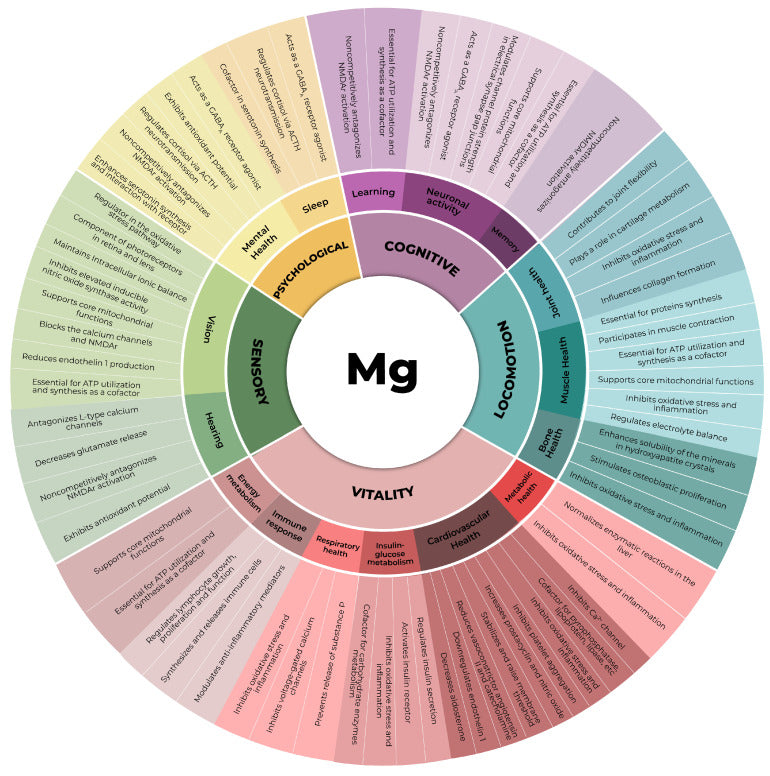
Unlocking the Secret to Vital Aging: The Magnesium Revolution
Imagine stepping into your golden years with the vigor and vitality of youth. Every step confident, every thought sharp, every muscle responsive. Aging doesn't have to be a slow surrender to frailty and decline. In fact, the key to unlocking a vibrant, dynamic life might just be hidden in a mineral we've long overlooked: magnesium.
The Unsung Hero of Human Physiology
Magnesium isn't just another nutrient—it's a powerhouse involved in over 800 biochemical reactions in your body. Picture it as the master conductor of an orchestra, ensuring every instrument (or biological process) plays in harmony. From generating energy in your cells to synthesizing DNA and proteins, magnesium is indispensable.
Yet, as we age, our body's magnesium levels naturally decline. This isn't just a minor hiccup; it's a critical concern. Lower magnesium levels can lead to compromised muscle function, reduced energy production, and an increased risk of frailty. But why is magnesium so pivotal, especially for our muscles?
Magnesium: The Muscle Maestro
Your muscles are more than just for movement; they're essential for overall health, influencing everything from metabolism to immune function. Magnesium plays several vital roles here:
- Energy Production: Magnesium is crucial for the creation of ATP, the primary energy currency of your cells. Without it, your muscles can't perform at their peak, leading to fatigue and weakness.
- Protein Synthesis: It's involved in the synthesis of proteins, the building blocks of muscle tissue. Magnesium stabilizes the structures needed to create new proteins, aiding in muscle repair and growth.
- Muscle Contraction and Relaxation: It regulates the flow of calcium, which is essential for muscle contraction. Magnesium ensures muscles contract and relax properly, preventing cramps and spasms.
- Anti-inflammatory and Antioxidant Defense: It combats oxidative stress and inflammation, both of which contribute to muscle degeneration and aging.
Intrinsic Capacity: The Blueprint for Healthy Aging
The World Health Organization introduces a concept called Intrinsic Capacity (IC)—your body's physical and mental abilities combined. This includes locomotion, vitality, cognition, sensory function, and psychological well-being. Magnesium is the common thread weaving through all these domains.
Consider this: As magnesium levels drop, so does your intrinsic capacity. It's not just about muscles; it's about maintaining the very essence of what keeps you lively and independent.
The Magnesium Deficiency Dilemma
Despite its importance, magnesium deficiency is surprisingly common, especially among older adults. Factors contributing to this include:
- Reduced Dietary Intake: Aging can lead to decreased appetite and changes in diet, resulting in lower magnesium consumption.
- Absorption Issues: Age-related changes in the gut can hinder magnesium absorption.
- Increased Excretion: Certain medications and chronic conditions common in older adults can increase magnesium loss.
The consequences? Increased inflammation, oxidative stress, muscle weakness, and a higher risk of chronic diseases.
Mechanistic Insights: How Magnesium Works Its Magic
Let's delve deeper into the mechanisms—how exactly does magnesium influence our health?
- Mitochondrial Function: Magnesium is essential for mitochondrial health—the energy factories of our cells. It aids in ATP production, ensuring cells have the energy they need.
- Enzyme Activation: Over 600 enzymes require magnesium to function. These enzymes are involved in vital processes like DNA repair, muscle contractions, and nerve function.
- Electrolyte Balance: Magnesium helps maintain proper levels of other electrolytes like potassium and calcium, crucial for nerve impulses and muscle contractions.
- Anti-inflammatory Pathways: It modulates the NF-κB pathway, reducing chronic inflammation—a key player in aging and many diseases.
Rewriting the Aging Narrative
What if we could change the way we age? By ensuring optimal magnesium levels, we're not just supporting muscle health—we're enhancing cognitive function, boosting energy levels, and fortifying our body's defenses against the stresses of aging.
Studies have shown that adequate magnesium intake is associated with:
- Improved Muscle Function: Enhanced strength and reduced cramps.
- Reduced Inflammation: Lower levels of inflammatory markers in the body.
- Better Bone Health: Magnesium works synergistically with calcium and vitamin D to maintain strong bones.
- Enhanced Cognitive Function: Magnesium plays a role in nerve transmission and may protect against neurodegenerative diseases.
Taking Action: Your Magnesium Blueprint
So, how can you harness the power of magnesium?
- Dietary Choices: Incorporate magnesium-rich foods into your meals. Think green leafy vegetables (like spinach), nuts and seeds (almonds, pumpkin seeds), whole grains, legumes, and fatty fish.
- Supplements: If dietary intake isn't enough, consider magnesium supplements. Consult with a healthcare professional to determine the appropriate form and dosage.
- Lifestyle Adjustments: Reduce factors that deplete magnesium, such as excessive alcohol consumption, stress, and certain medications.
Conclusion: Embrace a Magnesium-Rich Life
Aging is inevitable, but how we age is a choice. By prioritizing magnesium, we're choosing strength over weakness, vitality over fatigue, and independence over dependency.
Don't let magnesium be the missing link in your journey toward a vibrant life. Embrace it, and rewrite your aging story with chapters full of energy, health, and joy.
These statements have not been evaluated by the Food and Drug Administration. This product is not intended to diagnose, treat, cure or prevent any disease. This article is for informational purposes only and is not a substitute for professional medical advice. Always consult your healthcare provider regarding any health concerns or before starting new supplements.
